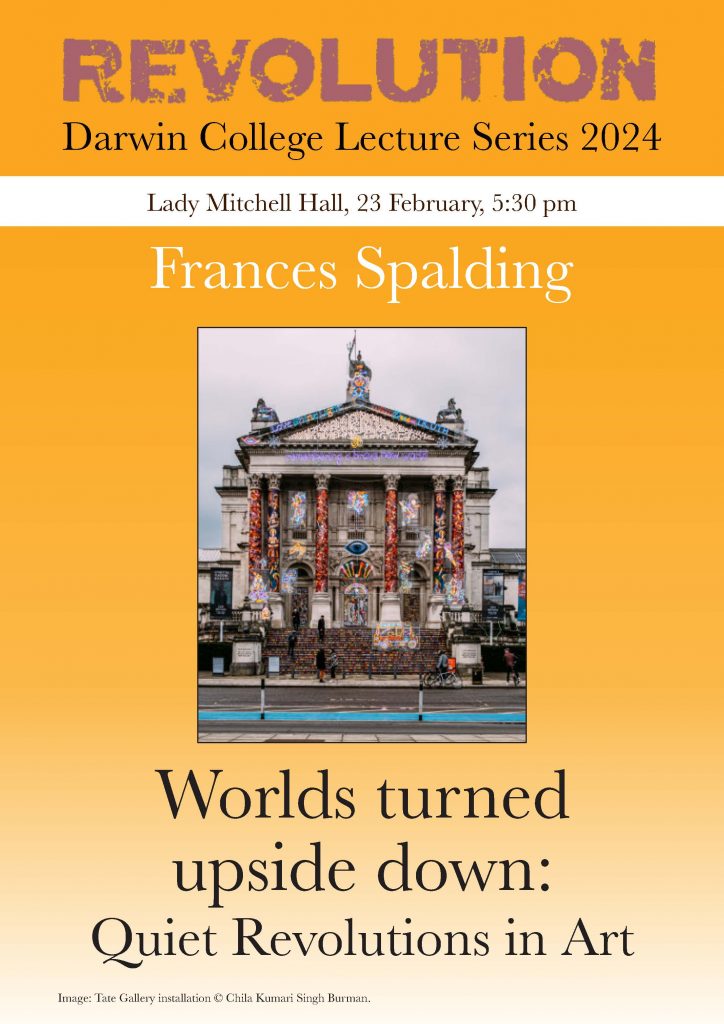Worlds turned upside down: Quiet Revolutions in Art – lecture by Professor Frances Spalding
Professor Frances Spalding, Art Committee Chair and Emeritus Fellow of Clare Hall, will be giving a talk as part of Revolution, the 2024 Darwin College Lecture Series. The series will explore the idea of Revolution from eight very different angles. The series are open to all and free to attend, and they take place on Fridays at 5.30pm in the Lady Mitchell Hall, Sidgwick Avenue.
Professor Spalding’s lecture asks why the Western European tradition occupies a hallowed role in world culture. E.H. Gombrich provides one answer to this question in his The Story of Art (1950), with reference to the restlessness within Western culture in comparison with some Eastern cultures that have lasted almost unchanged for a thousand years. His own book has done much to promote the Western view of art, having now reached its 16th edition, been translated into 30 languages, and sold 8 million copies. When Gombrich tried in the 12th edition to take the story of art up to the present day, he admitted some discomfort. Art veined with the revolutionary spirit had aligned itself more easily with progressive developments, with ‘primitivism’, modernism and modernity. Admittedly, modernism, modernity and even postcolonialism, with its reaction against Western Cultures, although moving towards globalisation, remain inextricably tied to the West. This has remained the case even during recent years, when the West’s socio-economic power has been challenged by global financial crises and troubled by the phenomenon of runaway global warming. Yet when a leading institute for the teaching of art history in this country admits that in the 2023- 24 academic year two-thirds of its classes are consigned to American and European art, more revolution is needed. More cross-cultural exchange, of the kind demonstrated by the British Library exhibition, Chinese and British; more interventions like Chila Burman’s transformation of classical imperial public buildings into palaces of Hindu delight; more things that surprise and can turn a world upside down.

Frances Spalding is an art historian, critic and biographer. She read art history at the University of Nottingham and began writing pieces for the TLS, The Burlington Magazine and art journals while still a postgraduate. She has a specialist interest in 20th century British art and first established her reputation with Roger Fry: Art and Life. She went on to write lives of the artists Vanessa Bell, John Minton, Duncan Grant, Gwen Raverat and John and Myfanwy Piper, as well as a biography of the poet Stevie Smith. Her survey history, British Art since 1900, in the Thames & Hudson World of Art series, has been widely used in schools, colleges and universities, and in the mid-1990s she was commissioned by the Tate to write a centenary history of this national institution. Between 2000 and 2015, she taught at Newcastle University, becoming Professor of Art History. She acted as Editor of The Burlington Magazine, 2015-16, and is now Emeritus Fellow of Clare Hall, Cambridge. She is also a Fellow of the Royal Society of Literature, an Honorary Fellow of the Royal College of Art and in 2005 was made a CBE for Services to Literature.